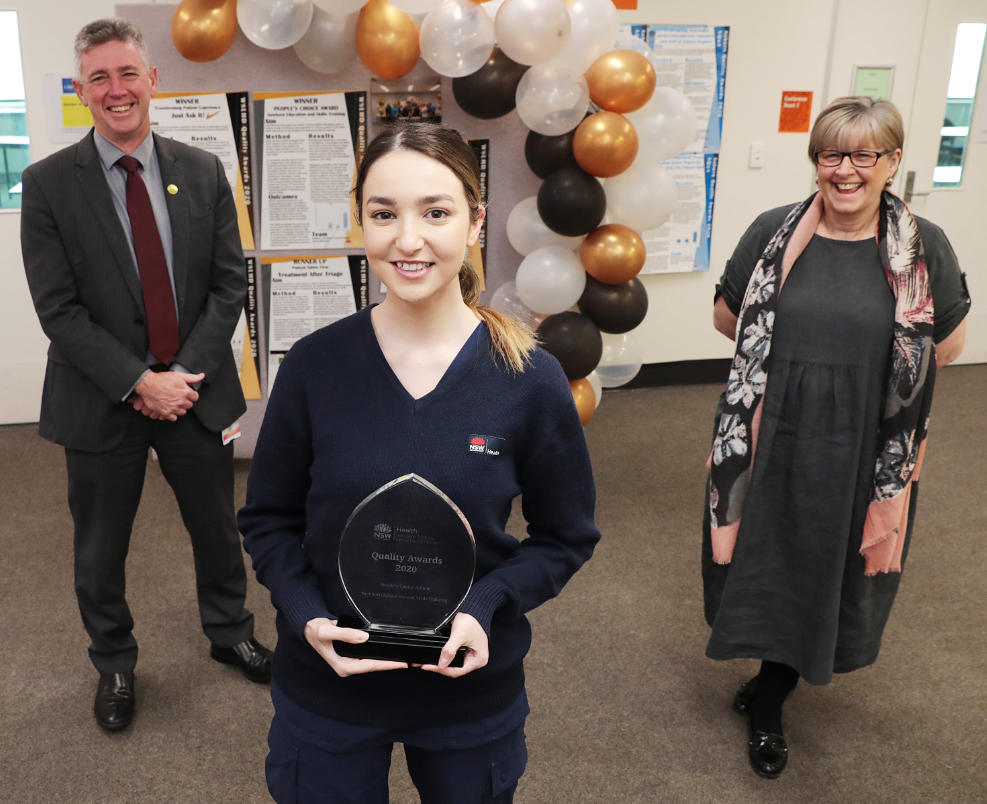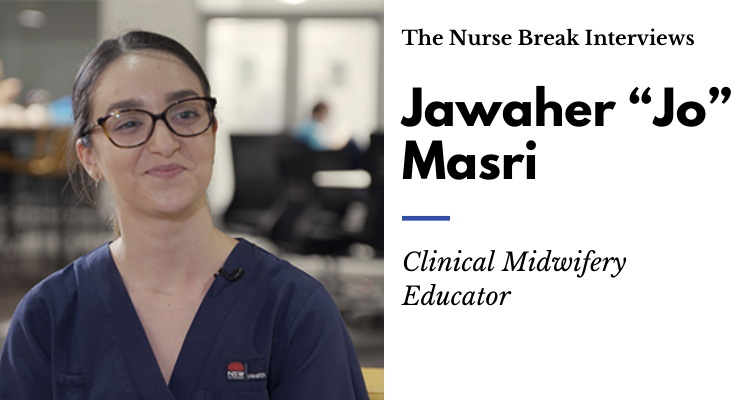Table of Contents
Meet Jawaher “Jo” Masri!

We teamed up with Western Sydney Local Health District – Auburn Hospital , to bring you this indepth Q&A with one of their amazing staff!
Jo from Western Sydney Local Health District (WSLHD) is one of three finalists in the NSW Midwife of the Year category. Jo is a clinical midwifery educator and oversees the education and training of all midwifery students and new graduates at Auburn Hospital, as well as ongoing education and mentoring for all the midwifery staff.
What motivated you to become a midwife?
When I was in high school I really thought I would end up studying archaeology – midwifery was never really on the agenda. I had just finished my final exams when my sister gave birth. I was very lucky to be able to support her during this process and I remember being in complete awe of her and the way she transformed into a powerful woman and mother right before my eyes. There is a level of magic during birth that you don’t feel anywhere else and the birth of my nephew was a major catalyst for me choosing to pursue midwifery.
How does one become a midwife?
There are a number of ways to become a midwife. I chose direct entry into a Bachelor of Midwifery degree as soon as I graduated high school. There are also opportunities to complete a Bachelor of Nursing degree first and then complete a postgraduate Diploma of Midwifery. The type of placements you get while training will vary based on the services provided by individual facilities, but you can expect to receive placements in antenatal clinics, birthing units, postnatal wards, special care nursery and community midwifery programs.
What is a typical day for you as a midwife at Auburn Hospital (before you were an educator)?
I was really fortunate to work across all units in our maternity service, but ended up firmly landing myself in the birth unit pretty soon after my new graduate year came to an end. What I loved most about working in our birth unit was that you never really know what could walk through the door. Generally speaking, on an average day I would be supporting women through normal labour and birth, but I might also be supporting at caesarean sections, assessing a woman in early labour, checking for ruptured membranes, providing breastfeeding support, transferring a woman and/or baby requiring higher levels of care and collaborating with other members of the multi-disciplinary team.
What is a typical day for you as a midwifery educator?
One of the things I like best about being a clinical midwifery educator is that there is no typical day! My role is really diverse – one day I may be working with new students or new graduates, while the next I’m running skills workshops, providing staff education, reviewing policies and procedures, or conducting clinical placement assessments.
What are the types of clinical presentations/patients you typically look after as a midwife?
Auburn Hospital has a low-risk maternity unit so the majority of women that we look after are healthy, well women. Our community has a significant number of women with comorbidities such as diabetes, and a high population of families from culturally and linguistically diverse backgrounds, so you become very comfortable with liaising with other members of the healthcare team.
What are some common complications and clinical deteriorations that midwives might face?
I think it’s important to remember that for the majority of women labour and birth will be a very normal and uncomplicated process – it’s really not how they make it out in the movies! Keeping this in mind, all midwives should be really skilled in recognising any changes from normal and knowing how to manage these, with a big focus on obstetric emergencies such as postpartum haemorrhage, shoulder dystocia, cord prolapse and abruption.
Right now we are also focusing really hard on the support we provide to women and families with mental health and social issues. COVID-19 has really changed the dynamic of birthing and we want to ensure that we are providing the right care for these women who can be very vulnerable in the current climate.
Compared to a Registered Nurse, how does scope of practice differ?
The main scope of difference – we support women having babies! A lot of the skills from nursing are transferable to midwifery but you will be equipped with a whole other skill set – think checking a placenta, teaching a woman how to breastfeed or hand express, performing abdominal palpation and interpreting fetal heart rate patterns. We still do your standard observations, medications, and manage IV infusions, but we also build skills in things like perineal repair, which is obviously more midwifery focused.
What are some of the most difficult and rewarding aspects of your work?
One of the most difficult but rewarding aspects of working as a midwife is supporting women who have had a pregnancy loss, stillbirth or neonatal death. Walking alongside a woman and her family through that process is a really heartbreaking but powerful experience. I really consider it a privilege to support them in any way I can. Even though it can be difficult, it is such an honour to get to know their babies and to help families create memories with them.
What interested you do be active in the education for the future midwives of Australia?
While working as a registered midwife I really enjoyed working with students and saw moving into the clinical education role as a natural progression from that. I really enjoy teaching and collaborating with others and saw the clinical educator role as a way to help shape our future midwives.
What additional education and experience did you need to become a midwife educator?
To become a clinical midwifery educator I completed a Certificate IV in Assessment and Training and a post-graduate degree in Perinatal Mental Health. I also completed all the advanced skills training for midwives required by our maternity service and became a staff assessor. My advice: find a good mentor! A good mentor can be such a game-changer when you’re building up the skills for an education or leadership role. If you’re interested in pursuing the education pathway it also helps to have a chat with your manager or education department and they can point you in the right direction.
Do you have any other roles and responsibilities as a midwife educator?
My role is really diverse and so are my responsibilities, so you really have the opportunity to branch out and explore a bunch of different skills. I’ve had the opportunity to be involved in research, quality improvement activities, developing professional development pathways, and reviewing policies and procedures. It is a really exciting role that gives you a lot of flexibility and opportunity for professional growth.
What attributes do you think make an adaptable and successful student/graduate midwife?
Have an open mind! Be willing to take feedback, reflect on your practice, and continue to grow. Seek out opportunities to develop skills that you maybe aren’t all that confident in. Know your scope and be honest about needing help when you do.
What advice would you give to junior/student/graduate midwives as they begin their career?
Be prepared to throw yourself into your clinical experiences. Don’t be afraid to take opportunities to build upon your skills and be actively involved in clinical care. Ask lots of questions and remember to be honest about things you don’t know. There’s no shame in asking for help when you need it, and your team will trust you a lot more for it.
What do you think is key to a successful career in nursing and midwifery?
A love of learning. You have to constantly be willing to adapt and change your practice based on best practice. This is a good thing! Focus on building up your skills.
Congratulations on your nomination for NSW Nurse and Midwife of the year. How did this come about?
To be selected for NSW Midwife of the Year nominators must be able to articulate how nominees demonstrate excellent women centred care.
I was actually given the opportunity to read through the nomination form recently and it was really moving. I was nominated by our maternity leadership team and Director of Nursing and Midwifery Services, Kate Murphy, who wrote lovely things about my commitment to midwifery education, patient-advocacy, role-modelling, team work, integrity and compassion. It was really nice to be recognised for all the things I work really hard on, like creating a positive and optimistic energy, and going the extra mile to ensure every woman feels safe and supported.
How do you think midwifery will look in 10-15 years’ time?
Hopefully not too different! I’d like to see more options for women to access alternative models of care and have these made more widely available across NSW.
What are your tips for nurses and midwives during this pandemic to manage the stress of their work and maintain a high standard of care for their patients?
Be honest when you are feeling overwhelmed. Reach out to your colleagues and seek support from them. We’re all in this together and it’s okay to say you need help. Check in with your friends, colleagues and don’t be afraid to say no to that overtime! You need your down-time too.
If you were in charge of Nursing and Midwifery in Australia, what would you change?
I truly believe that excellence is achieved through constant learning. Our healthcare system requires nurses and midwives to be highly skilled and adaptable, with a strong theoretical knowledge base. Learning doesn’t stop when you graduate, and we should continue to provide and encourage opportunities for nurses and midwives to develop their skills and knowledge.
Read other midwifery related content HERE
Australian College of Midwives
Looking for our next guest! Are you / do you know of an Aussie healthcare worker or student who would like to write about your/thier career, area of speciality, unique experiences or other nursing/midwifery/allied health related content? Please email us at hello@thenursebreak.org to discuss further or check out the Write for TNB Info Page on the website.






You must be logged in to post a comment.